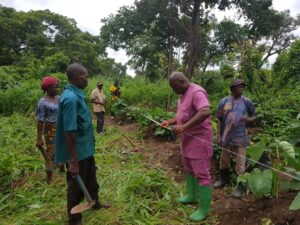Ben Ezechime, Enugu
The South African Social Development Organisation (SSDO) and ActionAid Nigeria have introduced and trained residents of Orokoro community in Isi-Uzo Local Government Area of Enugu State on Agro-ecology smart farming practices.
The Non-Governmental Organisations (NGOs), after organising the three-day intensive Agro-ecology smart farming training, also established a model farm under the Local Rights Programme in Orokoro community.
Speaking to newsmen after the training on Saturday, Miss Priye West, Local Rights Programme Officer in SSDO, said that the impact of climate change had been more evident, especially on agriculture in Nigeria, recently.
West noted that there was a need to move away from the age-long system and method of farming, if agriculture would continue to contribute to individual, family and societal economy.
According to her, erratic rainfall, flooding of farmlands, rising temperature and soil degradation have reduced farmers’ output and increase food insecurity in communities and society at large.
“Understanding this challenge, SSDO in partnership with ActionAid Nigeria have introduced and trained the residents in this agrarian community for them to make better yield and socio-economy fortunes from agriculture.
“Participants were trained on modern farming techniques and alternatives to chemical pest control and fertilisers.
“They also learnt new methods of farm water retention and how to ensure they retain soil fertility in their farms in order to increase farm yields and improve sales,” she said.
She also noted that the participants (or residents) were also given 75 improved palm seedlings for their model farm and personal farms.
Mr Theophilus Ivoh, an Agro-ecology expert from the state Ministry of Agriculture, said that the training also covered soil conservation, sustainable water management, reduction in the use of agro-chemicals, multiple cropping, rotation, and inter-cropping.
“I am happy that majority of the residents of the community, who are usually farmers, truly participated in the training and donated four plots of land for the model farm,” Ivoh said.
He said that the training and improved palm seedlings would help improve their socioeconomic status of their households and the community.
“The training will also help the community to be more resilient to climate change through afforestation and using improved seedlings and farming methods,” he said.
One of the participants at the training, Chief Benjamin Odu, said that he had learnt that ash, which is commonly got from local kitchens, helps to eliminate insects and preserve the crops better instead of chemicals.
“This new method of smart farming will create job opportunities for youths in the community and it will increase our palm oil yield and the community might have a palm oil cooperative society,” Odu said.
Another beneficiary of the training, Mrs Sarah Nwabuisi, said that she learnt that weeding the crop (farm) when due remains pivotal for optimal yield.
“I also learnt how to till the farm ground and mould the ridges to improve water retention and check flooding as well,” Nwabuisi said.

